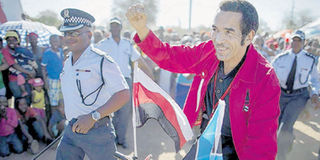The weird world of Ian Khama

Gaborone. He is the English-born son of a king, a fighter pilot, a teetotaling bachelor – and all that made him an unorthodox African president.
But Ian Khama stands out most for his final act as president of Botswana: stepping down.
At his home village of Serowe last week, residents begged him to stay on another 50 years – usually the cue in Africa that a constitutional change is about to be muscled through Parliament so a leader can rule for life.
But Khama, 65, insisted on leaving office at the weekend. His departure, which followed a decade of stable and largely uncontroversial rule, underscored a message he has oft repeated: Africa needs democracy.
Botswana, a nation of 2.2 million people, is the longest-running multiparty democracy on a continent whose leaders often cling to power into their 80s or 90s and rarely go without a fight.
In Uganda, President Yoweri Museveni has been in office since 1986. In Rwanda, President Paul Kagame recently won a third term, after the two-term limit was ditched. In Zimbabwe, Robert Mugabe hung on for nearly four decades until last year when the military forced him out. All claimed that their citizens would not let them leave office.
Khama’s exit preserves the legacy of his father, Seretse Khama, who struggled for his country’s independence from Britain and became the first president in 1966, ushering in more than 50 years of multiparty democracy.
The Mo Ibrahim Foundation, set up by the Sudanese British billionaire to measure and reward good governance in Africa, ranks Botswana the third most democratic country in Africa, behind Mauritius and the Seychelles.
Khama has frequently castigated his African counterparts, breaking the unspoken rule that you never publicly urge another president to quit, no matter how much violence there is or how many rigged elections.
He criticized Zimbabwe’s election in 2013 and called on Mugabe to step down in 2016 and again in November after the military took control there. He called on Joseph Kabila, president of the Democratic Republic of Congo, to hold elections that were due in 2016, and he slammed Burundian leader Pierre Nkurunziza, who plunged his country into turmoil in 2015 by ignoring a two-term limit and trampling the opposition on his way to his third term.
Khama has also stood up for the International Criminal Court and its efforts to prosecute other African leaders accused of crimes against humanity. Notably, he called on other African nations to enforce the court’s arrest warrant for Sudanese President Omar Hassan Ahmed Bashir and to stand with the Sudanese people against his oppressive rule.
He hasn’t been afraid to criticize mightier powers either, recently accusing President Donald Trump of encouraging wildlife poaching by overturning the ban on the import of hunting trophies to the US. He told the BBC he was not just concerned about wildlife, but Trump’s “attitude towards the whole planet.”
Khama seems to care more for the facts than flattery. When an online hoax news story circulated that Khama had been named “World’s Best President” in 2016, his office was quick to shoot down the story.
Not that Khama has no critics. His biggest blind spot as president was the treatment of the indigenous population, the Kalahari Bushmen, also known as the Basarwa or San people.
Forced out of their ancestral homeland in the diamond-rich Kalahari game reserve before Khama became president, the Bushmen won successive court appeals, giving them the right to return. But those who do are often arrested, beaten by police and denied hunting permits, according to Survival International, an advocacy group for indigenous people.
Khama, dismissive of the Bushmen’s semi-nomadic culture, has said the government’s job is to protect the park and preserve its wildlife. He claimed the Bushmen began using horses and guns to hunt, and in 2014 he told the Guardian newspaper that allowing them to live a “backward” way of life in the park jeopardized their children’s chances of gaining an education and joining the mainstream.
The US State Department’s human rights report on Botswana last year criticized the country for violence, particularly sexual violence against women and children; discrimination against the Basarwa people; and child labour, mainly in agriculture and herding.
But the report was equally notable for where it found nothing to criticize: Prison and detention met international standards; there were no reports of unlawful killings by security forces; the armed forces were under government control; elections were free and fair; and officials who committed offenses were prosecuted.
Botswana’s judiciary and media are independent, but detractors accuse Khama of intolerance of criticism and say his government harasses journalists. Khama accuses the media of publishing lies.
The governing Botswana Democratic Party has ruled since independence, partly because opposition parties are disunited, a problem that afflicts many countries in Africa. Even so, Khama is proud of his country’s system of government. “We have the strongest democracy in Africa and should guard it jealously,” he said in a farewell speech to Parliament.
Khama is the first-born son of his father, who was king of the Bamangwato people. Seretse Khama married an English office clerk and wartime ambulance driver named Ruth Williams in 1948 – a love story chronicled in the 2016 movie “A United Kingdom.” At the time, Botswana was one of the world’s poorest countries, but its economy boomed after diamonds were discovered in 1967.
Born in the English city of Surrey, Ian Khama inherited the title of kgosi, or king. He trained as a fighter pilot at the Royal Military Academy Sandhurst in Britain and became head of Botswana’s armed forces before he entered politics, effectively renouncing the role of king even as some Bamangwato people still see him that way.
He served as vice president from 1998 to 2008 under Festus Mogae, who stood down at the end of his two terms. As head of the governing party, Khama succeeded Mogae and was then elected in 2009 to a full term.
As president, he piloted the state helicopter when making domestic visits and sometimes gave children airplane joyrides. In 2006, as vice president, he took over the controls of an air force plane when it developed problems and crash-landed it in Francistown, a staff member told Botswana media at the time.
An outdoors enthusiast, Khama likes riding ATVs and power-chuting, which involves a parachute and a three-wheeled go-cart. He often volunteered as a server in soup kitchens and dropped by hospitals to visit the sick. Under Khama, the government made strides in reducing poverty and providing low income housing. (Los Angeles Times)
As a bachelor, Khama is unusual in Africa, where traditional values often hold sway. Often questioned about his single status, he claimed to be too busy to find a wife and worried about not having control over his happiness in marriage, though he once said he is looking for a tall, slim beauty to marry. He is lean and fit, but apparently is a loner who retires early at night.
During a recent farewell tour of the nation, Khama was showered with gifts, including a tractor, a herd of cows, hundreds of chickens and several cars. He told people he never really wanted to be president and now had other things to do.
Vice President Mokgweetsi Masisi was sworn in as president Sunday. (Los Angeles Times)




